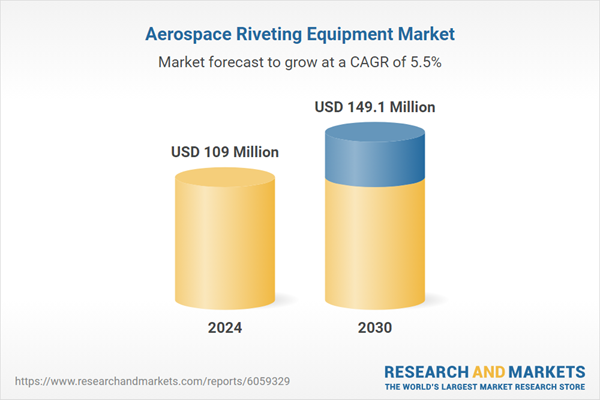Speak directly to the analyst to clarify any post sales queries you may have.
10% Free customizationThis report comes with 10% free customization, enabling you to add data that meets your specific business needs.
Technological advancements in riveting equipment are also playing a major role in market growth. Automation, robotics, and digitalization are becoming increasingly integrated into the aerospace manufacturing process, allowing for higher precision, reduced labor costs, and improved productivity. The adoption of smart riveting tools, equipped with sensors and real-time monitoring capabilities, ensures higher accuracy and consistency in fastening operations. As manufacturers look to enhance operational efficiency and reduce human error, the demand for automated riveting systems and the development of next-generation equipment is on the rise. These innovations also contribute to reducing maintenance costs and increasing the lifespan of both tools and finished products.
Market Drivers
Growing Demand for Lightweight Aircraft
The aerospace industry is increasingly prioritizing lightweight materials to improve fuel efficiency and reduce emissions. This trend demands new fastening technologies, as riveting equipment must be adapted to work with composites and other light materials. As manufacturers seek to meet stricter environmental standards, the need for advanced riveting equipment that can handle these materials effectively becomes a key driver of the market.For instance, in 2024, Airbus forecasts the delivery of over 42,000 new passenger aircraft by 2043, with significant demand for 15,000 single-aisle aircraft due to the growth in global air traffic. Additionally, the forecast highlights that the market will need to address environmental concerns, with the introduction of sustainable aviation technologies aimed at reducing emissions. This forecast reflects the continued expansion of the global airline industry, alongside advancements in fuel-efficient and environmentally friendly aircraft.
Key Market Challenges
High Initial Investment Costs
Advanced aerospace riveting equipment often comes with high upfront costs, making it a significant barrier for smaller manufacturers. While these systems offer long-term benefits, the initial capital investment can be prohibitive for companies looking to upgrade their equipment. This financial constraint limits the accessibility of the latest riveting technologies to larger firms with substantial budgets.Key Market Trends
Rise of Composite Materials
The shift toward composite materials in aircraft construction is one of the most prominent trends in the aerospace industry. Composites offer strength, flexibility, and reduced weight, but they require specific riveting techniques and equipment to ensure secure fastening. As aerospace companies continue to incorporate more composites into their designs, the demand for specialized riveting equipment that can handle these materials is growing.Key Market Players
- Atlas Copco AB
- Bollhoff Group
- Broetje-Automation GmbH
- Howmet Aerospace Inc
- LAS Aerospace Ltd
- Lockheed Martin Corporation
- SFS Group Germany GmbH
- Ingersoll Rand
- Sumake Industrial Co., Ltd.
- Dassault Systemes
Report Scope:
In this report, the global Aerospace Riveting Equipment market has been segmented into the following categories, in addition to the industry trends which have also been detailed below:Aerospace Riveting Equipment Market, By Rivet Type:
- Solid
- Blind
- Semi-tubular
Aerospace Riveting Equipment Market, By End Use:
- OEM
- MRO
Aerospace Riveting Equipment Market, By Equipment Type:
- Pneumatic
- Hydraulic
- Electric
Aerospace Riveting Equipment Market, By Mobility:
- Fixed
- Portable
Aerospace Riveting Equipment Market, By Technology:
- Automated
- Manual
Aerospace Riveting Equipment Market, By Region:
- North America
- United States
- Canada
- Mexico
- Europe & CIS
- Germany
- France
- U.K.
- Spain
- Italy
- Asia-Pacific
- China
- Japan
- India
- Indonesia
- South Korea
- Australia
- Middle East & Africa
- South Africa
- Saudi Arabia
- UAE
- South America
- Brazil
- Argentina
Competitive Landscape
Company Profiles: Detailed analysis of the major companies present in the global Aerospace Riveting Equipment Market.Available Customizations:
With the given market data, the publisher offers customizations according to the company’s specific needs. The following customization options are available for the report.Company Information
- Detailed analysis and profiling of additional market players (up to five).
This product will be delivered within 1-3 business days.
Table of Contents
Companies Mentioned
- Atlas Copco AB
- Bollhoff Group
- Broetje-Automation GmbH
- Howmet Aerospace Inc
- LAS Aerospace Ltd
- Lockheed Martin Corporation
- SFS Group Germany GmbH
- Ingersoll Rand
- Sumake Industrial Co., Ltd.
- Dassault Systemes
Table Information
| Report Attribute | Details |
|---|---|
| No. of Pages | 182 |
| Published | March 2025 |
| Forecast Period | 2024 - 2030 |
| Estimated Market Value ( USD | $ 109 Million |
| Forecasted Market Value ( USD | $ 149.1 Million |
| Compound Annual Growth Rate | 5.4% |
| Regions Covered | Global |
| No. of Companies Mentioned | 10 |









